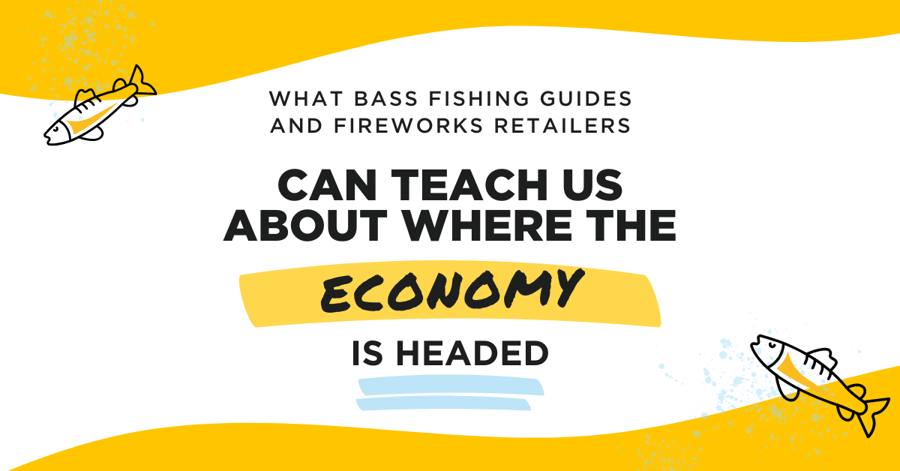
As consumer demand begins to soften, ensuring the accuracy of your forward forecasting is more essential than ever.
Bass fishing is big business in Missouri. People come from all over the world to come and fish our lakes during the peak summertime tourism season. But when I went out to the lake recently, I witnessed a different story. Soaring gas prices mean people aren’t running their boats as much. I can’t remember another time when I hadn’t seen a single other boat out on the lake in June like I did that day.
<< Learn more about our workshops focusing on implementation and strategic business planning. >>
People are canceling their trips as surging inflation and gas prices continue to take a bite out of their paychecks. Fishing guides, who normally work around the clock this time of year, are suddenly wondering if they’ll have any customers at all. At one marina I stopped at, the guides I spoke with told me they didn’t have any bookings for a week, and that their sales were already down $250,000 compared to last year.
Meanwhile, a friend of mine sells fireworks in retail stores. Summer is also his big season, with everything peaking on the July 4 holiday. He told me sales are down 6% this year through May. Perhaps more troubling for the future, in-store visits are down 27%. That might be a sign that consumers are shifting from spending on discretionary items like firecrackers to must-haves like food and gas.
But these changes aren’t limited to Missouri. Even a quick scan of the headlines these days show some warning signs. Amazon is looking to sell extra warehouse space. Elon Musk is tweeting that he plans to cut 10% of his workforce on top of big retailers like Walmart saying they are now overstaffed.
Meanwhile, Target announced that it's cancelling orders and actively looking to cut inventory of items like outdoor furniture. They aren’t alone. Other retailers like Abercrombie & Fitch, American Eagle, and Walmart also admit they were overstocked by 30% to 45% compared to a year ago—which means they’re looking to actively move their inventory to make room for the coming season. As a result, Walmart expects its profit margins to be cut in half for the next two quarters.
.gif?width=1200&name=Blog%20Pull%20Quote%20(1).gif)
The general thinking is that with interest rates rising to combat inflation, the economy is slowing down—maybe even sliding into a recession. All those consumers who couldn’t wait to spend the savings they built up are now scaling back. Big time. And when consumers stop spending, the entire supply chain takes a hit.
Surging Safety Stock
These shifts in the economy might be hard to identify. If you’re working behind schedule, where you can’t fill your orders because of shortages in people or parts, there’s a tendency to order, buy, or even hire more than you need. Maybe you start double and triple ordering to try and catch up. It’s kind of like how so many of us might have over-bought toilet paper when the pandemic hit. Maybe it’s just basic human psychology that when we’re threatened with a shortage, we want to hoard as much as we can. In manufacturing, we call this safety stock.
Shortages are still real. Baby formula, precious metals like nickel, computer chips. Housing. There’s even a scary projection that there’s going to be a shortage of beer in the fall due to the lack of grain and barley. The list goes on and on.
These are the seeds of inflation. When the price of a key commodity like oil spikes, everything that oil touches—from plastics all the way to transportation costs—spikes along with it.
But times are changing. While we spent the prior nine months talking about margins, we are now seeing a shift in how and what consumers are willing to spend money on. The critical number is now on the demand side. This is where things can get scary for companies if they are slow to adjust.
Beware The False Bottom
Last year around this time, we wrote a blog warning against the false economy. Our goal was to alert folks to the fact that when people are behind schedule and waiting for parts, they might place multiple orders from different vendors. Then, after that person receives a delivery, they will cancel the other orders they placed. If you are on the receiving end of one of those canceled orders, and you had begun to plan and forecast based on that order, well, you probably aren’t happy.
That’s why we were calling it the false economy. But now there’s a newer related threat emerging companies need to watch out for, something we might call the “false bottom.” Kind of like you might have extra space hidden inside a drawer or a closet, the economy might have some unexpected speedbumps ahead people might not yet be aware of.
Think about a situation like Ford and its big move into electric pick-up trucks. They paint a rosy picture: they have thousands of pre-orders. Their forecasts look amazing. But the reality is that customers only had to plunk down something like $100 deposit to buy a place in line for one of these trucks that might cost upwards of $70,000 with all the bells and whistles added in. Ford might be thinking they have an incredible order board. But how many of those potential buyers might say, “Eh, spending $70,000 right now is too much. We’ll forfeit the deposit.”
If enough people cancel their orders, Ford might be in for a rude awakening.
 Forecasting The Future
Forecasting The Future
While the “R” word is scary—a recession means the economy has contracted for two consecutive quarters—it is what companies do because of those slowdowns that should really keep us up at night. They lay people off. When you’re in the business of protecting jobs like we have been for 40 years, this is really frightening.
That means that as consumer demand softens, companies must be smarter about all those orders, or open positions, they’re trying to fill. It puts a lot of pressure on us to be as accurate as possible with our forecasts through 2023 so that we’re not left holding the bag if our customers start canceling orders on us. The last thing we want is to be sitting on a pile of inventory that nobody wants because we over-ordered in pursuit of building up that safety stock.
Worse, you never want to over hire people—only to simply lay them off when demand falls off a cliff. That’s why, inside our business, we’re telling everyone to be cautious—but also to be smart about what and how much they’re ordering.
Tapping The Wisdom Of The Crowd
This is the time of year where all our ten divisions get together for what we call our “Sales & Marketing” High-Involvement Planning meeting, where we share our collective forecasts for the rest of the year and ask all of our associates if they buy in. To ensure those forward forecasts are as accurate as possible, we ask our people to go out and dig for information on the market and their competitors. We are also checking with our customers that the orders they’ve placed are real—and they’re not just ordering safety stock because of long lead times.
We want them to understand what the true demand is—and not to just hope and pray that the orders will be there. And if they see demand softening, then we also need to be developing sufficient contingency plans to make up for it.
That’s how we can do our best to control our own destiny, and ensure we protect the jobs of everyone we work with no matter what happens with the economy in the coming months. As we’ve said before, if you can control the forecast, you can control the world.
Looking to stay ahead of your business? Attend our event on strategic planning. Walk away with tools, insights, and an actionable plan to make next year a success..png?width=790&name=HIP%20Workshop%20CTA%20(1).png)
.png)






.png)




-5.png)

